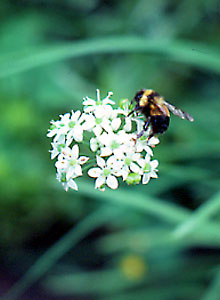
Assuming reasonably good soil and water, the easiest way to boost yields of almost any fruit--not just apples and strawberries but melons, squash, tomatoes and peppers, too--is to get better pollination. And that usually means honeybees. When growers put more hives in fields, they get more and bigger fruits.
For most of today's gardeners, however, keeping honeybees takes too much time. And there's the threat of stings and swarms. Amateur beekeeping is on the wane, and wild honeybee colonies are being ravaged by mites and disease. A recent report from New York says about 95 percent of the feral honeybee colonies there are now dead.
No need to worry, though. Commercial beekeepers have the nation's honeypots overflowing. And a dedicated band of USDA researchers points out another kind of bee that is probably better in gardens and orchards--the solitary or pollen bee. These bees don't swarm and they don't sting, unless you pinch or step on them.
And most are much better pollinators than honeybees, which are native to Eurasia and Africa. Pollen bees are fast. A Japanese orchard bee being studied for commercial use here can pollinate 2,450 apple blossoms a day, whereas a honeybee will visit only about 500.
Solitary bees come in all sizes. Bumblebees, including all-black carpenter bees, are probably the most recognizable. Many others, such as mason and leafcutter bees, are tiny and go about their work largely unnoticed. Solitary bees tend to be active for much shorter periods of the growing season, and so are somewhat crop specific. But with so many kinds (3,000 to 4,000 species are native), there are plenty of wild bee pollinators all season long from coast to coast.
Still, it's good to encourage more of them in your garden, and that is easy to do. Most nest in holes in the ground. And many use holes bored in wood by beetles and other creatures. In arid parts of the West, wood nesting sites are in short supply and bees can spend as much as 95 percent of their time looking for holes in branches or bark. Anywhere in the country, if you create more habitat in your garden, you'll get more solitary bees.
Semi-wild places where the ground is unworked is what they need. An unsprayed lawn or borders with shrubs, perennials and grasses will suit various ground nesters. When you prune shrubs like elderberries and forsythia, you expose hollow stems favored by other species.
Attract mason and leafcutter bees with blocks of wood drilled with holes. Use a 5/16-inch drill and space holes about 3/4-inch apart. Make the holes 3 to 6 inches deep. Place the blocks in a protected location, from ground level up to about 4 or 5 feet above the ground.
Jack Ruttle is a former editor at National Gardening.
 Victory Seed Company has all the seeds you want for your best garden in 2024.
Victory Seed Company has all the seeds you want for your best garden in 2024.
For 25 years, the family-owned Victory Seed Company has provided the highest quality vegetable, herb and flower seeds to families across the country. We are passionate about providing you the best seeds available that give excellent germination, robust plants, and the harvest you want. With a catalog of over a thousand varieties, we have everything, and our prices are the kinds that we'd want to pay. We have hundreds of yesterday's heirloom vegetables, as well as today's award winning hybrid selections. Get to know us by visiting our website and browsing through our online vegetable seed catalog.